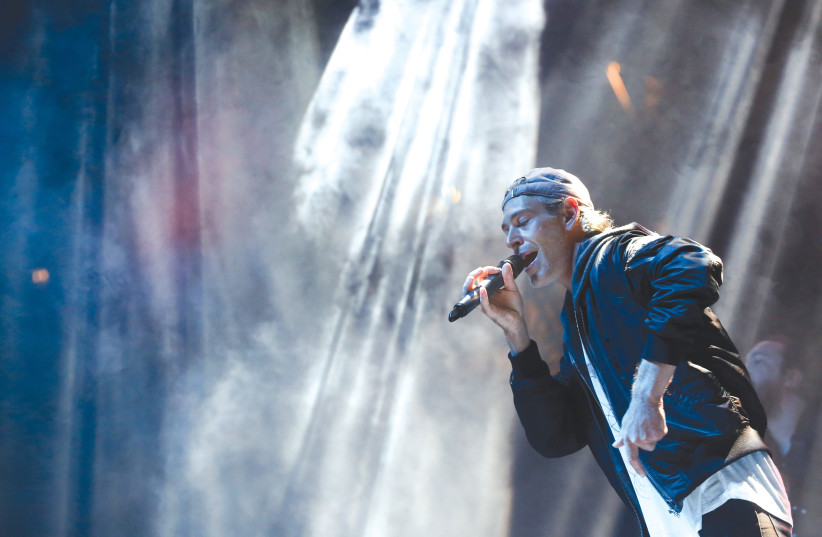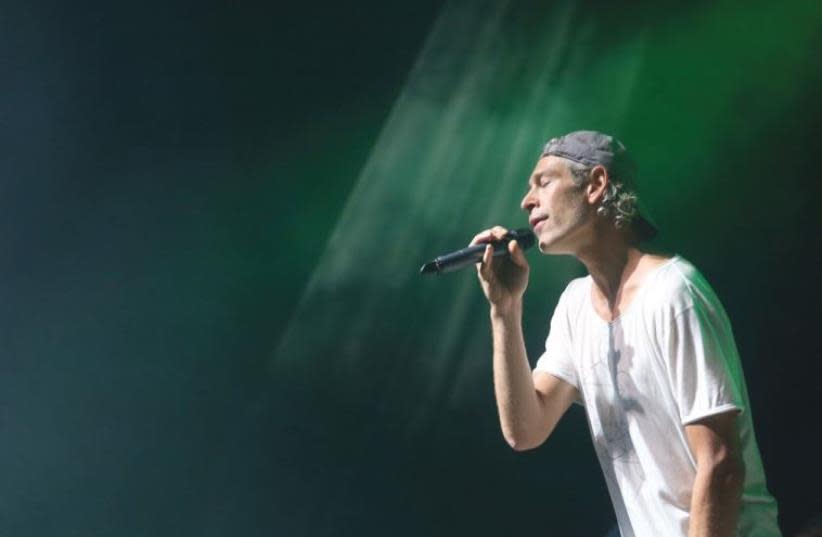On Wednesday night, some two dozen members of the Portland, Maine, police force held a line outside the city’s downtown State Theater wielding Tasers, nightsticks, and pepper ball guns. According to the Bangor Daily News, an equal number of protesters gathered on the other side of the street shouting hackneyed clichés through bullhorns.
The reason for the tense standoff wasn’t global warming, the divisive US border issue, or the upcoming contentious presidential election. It was because inside the theater, nearly 2,000 fans were getting ready to dance and sway to the music of Jewish, reggae-tinged rocker Matisyahu.
The protesters, ironically mostly from a loose aggregate called Maine Jews for Palestine, were not pleased that the singer has unabashedly backed Israel in its efforts to eradicate Hamas and return the hostages being held in Gaza, and didn’t think he should be allotted the freedom of speech that other Americans are granted.
That irrational response, alongside the cancel culture permeating America for anyone who utters the dreaded Z-word (Zionism) in the toxic post-October 7 atmosphere, has thrust Matisyahu into the headlights as a prime target of pro-Hamas activists.
The 44-year-old Grammy-nominated singer, who has established a staunch following with spiritual anthems like “One Day,” and “King Without a Crown,” has been one of the few in the US entertainment industry to visit Israel since the beginning of the Gaza war. In addition to performing in Tel Aviv, he appeared at a rally for the hostages, met with their families, and performed for IDF troops during a January visit.
After returning to the US, he told Newsweek “I would like to see any terrorist, Hamas, or person who believes Israel has no right to exist or the Jews have no right to it, I would like Israel [to] destroy those people.”
That utterly reasonable statement in light of October 7 was partially what brought out the Portland protesters, with one telling the Bangor Daily News, “There’s no place in Portland for someone like him providing material and moral support for an army currently committing genocide.”

AHEAD OF the rabid frenzy, a few hours earlier, a wool-capped Matisyahu was experiencing calm, resting in his tour bus outside the theater. In a thoughtful mood, he assessed the weird twists and turns of his current 34-date tour that sparked cancellations, controversy, police protection and headlines.
“I’m feeling really out of place in America since October 7 and disconnected from everywhere that I’m going,” he said via a Zoom video call with The Jerusalem Post.
“It feels like being out alone in the world. It feels like it must have felt for the Jews of generations that came before us that lived in antisemitic climates. So it’s this weird thing that feels new and old at the same time, like it exists somewhere deep in my blood and DNA. There’s also this feeling that most everyone is against you or out to get you, or doesn’t understand you or where you come from. It’s a horrible feeling. These are very dark times in America. It feels pretty f***in’ scary out there.
“But the one place that I don’t feel that is at a Matisyahu show. You see these people funneling through protesters, and having to deal with all this darkness and hatred. And then when the show starts and the yarmulkes are on, and the Israeli flags are held high, there’s a very special feeling. I get the sense of almost being in Israel. My shows hadn’t felt like that for a long time, like they have since October 7.”
When Hamas attacked Israel on that fateful day, sparking the current war, Matisyahu was in Las Vegas, performing at a reggae festival. He didn’t know what to do or what to feel.
“We were following what was coming out of Israel like everyone else,” he said.
“It was Shabbat, and my son was in Jerusalem [where he’s studying in a yeshiva], so I wasn’t able to talk to him. So I was stressed out, hoping that he was OK. And then, I felt weird and uncomfortable about performing a concert. I reached out to another Jewish artist whose band was also performing at the festival to ask him what he thought, and he ignored me and didn’t want anything to do with the issue.”
He eventually went onstage, and during the performance something happened that’s since become a staple at all of his shows.
“I guess that was the first time I saw someone in the audience with an Israeli flag. I brought it onstage and wrapped myself in it. It was an immediate gut reaction to what had happened.”
The Israeli flags, as well as a chair he puts onstage to represent the hostages being held by Hamas, will undoubtedly be present when Matisyahu arrives back in Israel next month for two shows – April 2 in Jerusalem and April 3 in Tel Aviv – the culmination of his current tour, which also began in Tel Aviv back in January.
“When I was in Israel in January, I felt a sense of light that I wasn’t feeling in America. It really empowered me and gave me a feeling of hope for the future, hope in our people, in our land, and in our God. And I’ve taken that with me on this tour, which is winding up. Coming back to Israel to end it will make it into a full circle,” he said.
Although the Portland show took place despite the protests, three other US shows on his tour – in Tucson, Arizona, Santa Fe, New Mexico, and, most recently, Chicago – were canceled over the controversy surrounding Matisyahu’s support for Israel.
“All three shows were officially canceled for different reasons, but they all share the same connection,” he said.
“The pro-Hamas supporters who are confused thinking they’re pro-Palestinian and who are really just anti-Israel are exerting pressure tactics – and when they put on pressure, certain people in the chain are falling down. One show it was the staff, one show it was the buyer, and the most recent one it seems like it was someone higher up.”

Union stagehands refused to show up to work for Matisyahu show
At the Portland show, three union stagehands decided not to show up to work, according to the Bangor Daily News.
One of them, Kevin Lee, told the News that “Matisyahu was just over there [Israel] raising the spirits of an army that bombs hospitals. I was very clear with my boss as to why I’m not there.”
Since it’s futile to argue with that kind of warped logic, Matisyahu, who has been filmed on YouTube ranting against “ignorant millennials,” said that these days he tries to focus on the positive, citing those Jewish performers like him who have worn their Zionist flags on their sleeves since October 7.
“I can’t say enough about [actor] Michael Rapaport, Bret Gelman [from Stranger Things] and David Draiman [frontman for metal giants Disturbed] – the few, like me, for whom it’s not even a question. It’s in our blood and bones. This Jewishness – we have no choice,” he said, adding that the Oscars ceremony filled him with “disgust and anger.”
Unlike the Steven Spielbergs and Natalie Portmans of Hollywood who have remained silent, or worse, since the Gaza war broke out, or the slew of film and music industry celebs who sported the bloodred Ceasefire Now buttons at this week’s Academy Awards, Matisyahu puts his support for Israel ahead of his career – even if it comes with a potentially costly price.
“Yeah, I do have trepidations about being able to make a living if this keeps up. I don’t know what the future holds. I know that I’m always going to keep on making music, but obviously I’m going to be affected by this backlash, at least in the short term,” he said, adding that he doesn’t rule out moving to Israel. “That would obviously be my first option.”
It would be a natural fit, as Matisyahu, skirting the hassidic and secular worlds for 20 years, has provided inspiration to Jewish music fans and, with his 2005 breakout hit, “King Without a Crown,” helped make tzitzit and peyot (sidelocks) cool among the MTV crowd.
Jerusalem resident Alex Weinstein, originally from Leeds, recalled first seeing the video and buying Matisyahu’s early albums.
“Me and my friends didn’t grow up in a particularly religious community like London or Manchester, so we had one foot in the British world, and one foot in the Jewish world, sort of balancing both acts,” he said.
“And then this guy came along singing reggae and dub about mashiah and Jerusalem and God. It was both awesome music and a reaffirmation of everything we believed in, and gave us confidence to be proud Jews. He was important to me growing up.”
DURING HIS stay in Israel next month, the now peyot-less Matisyahu will be one of four recipients of a prize from Diaspora Affairs Minister Amichai Chikli for their efforts to advocate for Israel since the beginning of the Gaza war.
The other recipients will be Rapaport, who has been ubiquitous on social media and as a guest on the popular satirical TV show Eretz Nehederet (Wonderful Country); Israel advocate Aviva Klompas; and Visegrad24 founder and media influencer Stefan Tompson.
But Matisyahu is more focused on the music, and the shows at Zappa Jerusalem and Zappa Ganei Yehoshua, where he’ll be backed by his crack four-piece band.
“Because I don’t treat my shows as paintings that need to be replicated from night to night, but as something that’s organic, they’ve been extremely connected to what’s going on now in Israel. Lyrics from old songs have new meanings, and having the flags and the hostage chair onstage provides a spark and inspiration,” he said.
“I can’t wait to be back there singing and dancing – and hearing your stories and telling you my stories, and connecting. I’ve never felt closer to Israel and the Israeli people – my cousins.”
Matisyahu will be appearing on April 2 at Zappa Jerusalem and on April 3 at Zappa Ganei Yehoshua in Tel Aviv.
